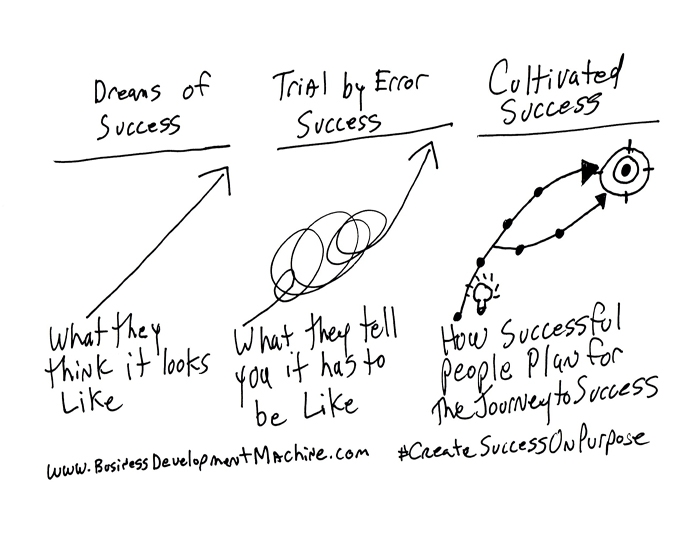What People Think Success Looks Like? The New Road Map
/"Without a specific destination any road will take you there." Bill Baylis, Business Development expert from Long Island, NY. Quickly sketches out "What people think Success Looks Like" adding his own twist on to making the business trip a journey
If your company/firm
To create a different result requires change.
Example: Too often in business, we follow the follower. Why not see it
Business Development is a road trip to the life you aspire. Your business is the vehicle to get you there by providing the income to live. How will you get there?
The Road Map
That journey begins by clearly defining specific results in terms of income and quality of life sought for the partners and as well as staff. What are the results that you want? What changes must be introduced to achieve them? How long will it take? What is the cost vs. the benefit? How will you create the change? How will you know where to begin? How will you overcome inaction? How will you know when you arrive? Who will make the decision? When?
The Journey Begins With A Decision
A trap that companies/firms fall into is confusing making a decision with creating results. We tend to become obsessed with making the right decision (paralysis by analysis) which in itself becomes a major obstacle. Did we make the right decision? Did we have all the information requisite to make the decision? Is it possible that a better decision could have been made if better information were produced? It's always better to make the right decision rather than the wrong decision. We forget the simple fact that a decision by itself changes nothing. Did you implement the decision? Did you do anything? A decision is the beginning of the process of doing, not the end of the process.
Take Action?
Doing makes things happen. The currently popular concept of knowledge management advocates is gaining intellectual capital to grow your company/firm. Learn about branding, hire MBAs, hire a kid to run your social media, develop a new niche and specific knowledge, and get additional certifications. An advocate on LinkedIn is advocating how a simple customer avatar can help you focus your message and close more sales. (By the way, what heck is an Avator and what does it buy? Lol) What advocates seem to forget is that knowledge is only useful if you do something with it. There is a huge knowing-doing gap. Doing something actually means doing something! It means addressing the hard and scary work of making something happen. It's much easier and safer to sit around and have meetings and intellectual conversations, to add to your library, build databases, train for additional certifications, invest in technical infrastructure - and never actually implement anything.
Earn While You Learn?
It must acknowledge and support effort. Repeated effort and doing creates change. There is no easy way to encourage people to learn. They must be motivated to learn for their own reasons, not the firms'. You must address the What’s in for Me (WIIFM) factor. You must accept the fact there's always going to be a trade-off between efficiency and learning. Learners are never as proficient as experts. Learning comes at a price. One price is the experts might not get to use their expertise and that the learners might make mistakes. If you really want to build a learning organization, you must be prepared to pay the price.
The Business Killer
That’s the way we've always done it. Another huge obstacle to cultural change is professional (or corporate) memory. The underlying emotion is, again, fear. "This is the way we do things around here, it's the way of the profession" overrides "this is the right way to do things." Mistakes are the bane of the profession. The best way to avoid mistakes is to continue to do things the way they have always been done. That's fine for the attest function. It vastly limits non-attest functions and severely restricts change. Eventually, like with hourly billing, what was originally adopted as a means to an end, becomes the end itself. What is created are sacred cows - things that are taken for granted, belief systems, processes, practices, rules you perceive will help you get things done. In truth, all they do is create obstacles to getting things done.
Look At It As a Journey
So where do we begin? Begin by making a decision to do something. Be open to change. Begin by building a culture of action. Cultural change is evolution, not revolution. It takes time. Be prepared to make an investment in time and money. Be prepared to start doing. If the doing is consistent, you can expect a handsome return on your investment. If you expect the future to be better than the present, you need to begin now. Plan your work and work your plan. Remember your goal is better than, not optimal. Do something today better than you did yesterday. Enjoy the result. Gain confidence. Internalize the new behavior. Do something tomorrow, that's better than today. Internalize the results and move ahead.
In successful business development, there is no knowing/doing gap. There is no difference between how they think, who they are and what they do!





